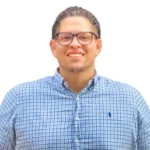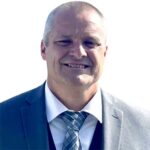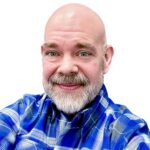Our outpatient center offers tailored care and support, helping you manage challenges, build resilience, and achieve lasting well-being.
After earning his degree in English from New York University and working in several editorial roles, Zach decided to follow his passion for helping others. He shifted his career to focus on supporting people through personal growth and change, believing that his own experiences with navigating life transitions provide valuable insights for guiding others through their own challenges.
Over the past eight years, Zach has worked and volunteered in various clinical settings and cultural contexts. He earned his Master of Social Work (MSW) from Florida International University. He has extensive experience in interventions for individuals with addictions, those with histories of incarceration, and clients dealing with sexual victimization and perpetration. He is particularly focused on helping people heal from traumatic life experiences.
Zach uses a client-centered approach, drawing on several therapeutic modalities such as Cognitive Behavioral Therapy (CBT), Acceptance and Commitment Therapy (ACT), mindfulness, and solution-focused practices. Zach is also trained in Eye Movement Desensitization and Reprocessing (EMDR) through Francine Shapiro’s Humanitarian Assistance Program, with additional training in dissociation and complex trauma. He is supportive of 12-step recovery programs and integrates this understanding into his practice.
I am Dominique a double board-certified family nurse practitioner (FNP-C) and psychiatric mental health nurse practitioner (PMHNP-BC), with a master’s in nursing practice (MSN). I am passionate about providing quality, compassionate, and comprehensive mental health services to adolescents and adults. I possess strong clinical skills enhanced by natural ability to build rapport with patients and families. I follow evidence-based guidelines blended with clinical experience, personal observation, and intuition. As a PMHNP, my role is multifaceted, including educator, mental health advocate and therapist.
I value interdisciplinary education and inter-professional collaboration for a whole person, patient centered approach to health and healthcare. I provide patient assessment, diagnosis and treatment plans in accordance with statues, regulations and protocols regulating the profession. I enjoy advocating for innovations in the mental health care space and I have special interests in the integration of behavioral medicine, trauma informed care, suicide prevention, and addressing families that care for family members with addition habits.
Degrees
Certifications
Memberships and Associations
Areas of Interest
 Megan holds a Master’s degree in Clinical Psychology from Pepperdine University. She takes a holistic approach, building upon her client’s strengths and resources. Trained in EMDR and Ego State Therapy, she also integrates Internal Family Systems (IFS) and body-based somatic therapies into her practice to help clients regulate their nervous system and address trauma contributing to addiction issues. In addition to working at Stairways, Megan works in private practice as an AMFT, specializing in women’s health issues.
Megan holds a Master’s degree in Clinical Psychology from Pepperdine University. She takes a holistic approach, building upon her client’s strengths and resources. Trained in EMDR and Ego State Therapy, she also integrates Internal Family Systems (IFS) and body-based somatic therapies into her practice to help clients regulate their nervous system and address trauma contributing to addiction issues. In addition to working at Stairways, Megan works in private practice as an AMFT, specializing in women’s health issues.
 Shayne graduated with a Master’s in Counseling from Loyola Marymount University. He is trained in Cognitive Behavioral Therapy (CBT) and solution-focused techniques, with a special emphasis on supporting recovery from addiction and substance use disorders (SUD). Shayne believes that therapy should empower clients to reclaim their lives and move beyond merely surviving to thriving in recovery.
Shayne graduated with a Master’s in Counseling from Loyola Marymount University. He is trained in Cognitive Behavioral Therapy (CBT) and solution-focused techniques, with a special emphasis on supporting recovery from addiction and substance use disorders (SUD). Shayne believes that therapy should empower clients to reclaim their lives and move beyond merely surviving to thriving in recovery.
Shayne is a Licensed Professional Clinical Counselor (LPCC #16366) who works with clients at Stairway Resource Center. His approach is centered on collaboration and practical strategies, providing a supportive environment for clients to achieve lasting sobriety and personal growth.
 Amanda graduated with a Master’s degree in Counseling Psychology with a specialization in Psychological Trauma from California Lutheran University. She is trained in psychodynamic theories with a focus on family systems and practices from a client-centered treatment approach. Amanda’s work is deeply rooted in respect, empathy, reliability, and professionalism. In addition to seeing clients in private practice, she works with individual clients and runs group therapies at Stairway Resource Center, under the supervision of Rosa Blasi-Harris, LMFT#129195.
Amanda graduated with a Master’s degree in Counseling Psychology with a specialization in Psychological Trauma from California Lutheran University. She is trained in psychodynamic theories with a focus on family systems and practices from a client-centered treatment approach. Amanda’s work is deeply rooted in respect, empathy, reliability, and professionalism. In addition to seeing clients in private practice, she works with individual clients and runs group therapies at Stairway Resource Center, under the supervision of Rosa Blasi-Harris, LMFT#129195.
 Michael has been an avid and successful entrepreneur since 2004, with experience in various industries including; entertainment, production, retail consumer goods, and transitional residential programs and multi-unit housing facilities.
Michael has been an avid and successful entrepreneur since 2004, with experience in various industries including; entertainment, production, retail consumer goods, and transitional residential programs and multi-unit housing facilities.
He is highly driven by his commitment and passion to help others who are in need of recovery and has been helping people to achieve their goals for several years with tremendous success. His reputation is well known within the treatment community and amongst people who actively are working on their recovery and want to live a sober life.
Michael oversees the daily operations of Stairway Recovery Homes, the partner of Stairway Resource Center, which is located in Southern California. Stairway Recovery has nine residential homes and houses over 100 people in the sober community. Not only do the people in the Stairway Recovery community stay sober, but they are also able to create new meaningful relationships and lives that they never thought possible.
Michael’s vision has become a reality, manifested by the rebuilt lives and realized dreams of the people he serves.
 As an experienced business leader and Co-Founder, Travis leveraged his leadership skills and personal family experience with addiction to inspire and create an innovative and patient-first culture at Stairway Resource Center.
As an experienced business leader and Co-Founder, Travis leveraged his leadership skills and personal family experience with addiction to inspire and create an innovative and patient-first culture at Stairway Resource Center.
Travis oversees the facilities’ Performance Improvement process, which ensures that SRC holds itself to the highest standards so that our clients receive the best quality of care. Additionally, he ensures compliance with all federal and state regulations, licensure, and Joint Commission Accreditation.
Travis is passionate about his work because it provides the opportunity to assist those with similar experiences to his. The virulent problem of addiction is very personal for Travis. He saw first-hand the tragic consequences of addiction in his own family as a young boy, and from that experience made a commitment to someday help others battle this devastating disease.
Travis and his wife, Elyssa, are longtime residents of Southern California. They split their time between their homes in Woodland Hills and Mammoth Lakes.
 Jessi Brown, Senior Director of Admission and Client Experience, is more than just a member of the Stairways Resource Center team, she is an example of what this community can achieve and an example to all of our clients, especially the women.
Jessi Brown, Senior Director of Admission and Client Experience, is more than just a member of the Stairways Resource Center team, she is an example of what this community can achieve and an example to all of our clients, especially the women.
Jessi has been working in the field of recovery since 2007 and joined this team as manager of the first female sober living at Stairway Recovery Homes and went on to design and implement the woman’s program at SRC. She continues to take on additional responsibilities within operations, to ensure our clients are receiving the highest level of support possible, but more importantly, Jessi continues to inspire and change the lives of young women, who can relate to her experiences, each and everyday.
 Max has been working in substance abuse treatment for the past 10 years. He completed his Masters at Pacifica Graduate Institue and wrote his thesis on group therapy for addicted populations. He has run over 3000 groups and currently runs the family group at Stairways on Tuesday nights. With individual clients, he practices Habib Davanloo’s Intensve Short Term Dynamic Psychotherapy (ISTDP) and believes it to be the most powerful approach in individual counseling for those suffering with addiction, helping clients quickly resolve core issues that had often previously been ignored. He has been sober for almost 2 decades. He opens the batting for Pickwick Cricket Club.
Max has been working in substance abuse treatment for the past 10 years. He completed his Masters at Pacifica Graduate Institue and wrote his thesis on group therapy for addicted populations. He has run over 3000 groups and currently runs the family group at Stairways on Tuesday nights. With individual clients, he practices Habib Davanloo’s Intensve Short Term Dynamic Psychotherapy (ISTDP) and believes it to be the most powerful approach in individual counseling for those suffering with addiction, helping clients quickly resolve core issues that had often previously been ignored. He has been sober for almost 2 decades. He opens the batting for Pickwick Cricket Club.
 Tyson has worked in the treatment field since 2015 he has influenced a culture shift for individuals struggling with Substance Use Disorders and seemingly hopeless circumstances in his community.
Tyson has worked in the treatment field since 2015 he has influenced a culture shift for individuals struggling with Substance Use Disorders and seemingly hopeless circumstances in his community.
Through his professional life as a licensed interventionist and serving the recovery community with a large fellowship of resources Tyson is literally in the business of saving lives. Recovery also lives and breathes in his personal life, he has an altruistic spirit wrapped around a grateful heart. Tyson enjoys surfing, raising his children (Seamus and Liv), volunteering at Charle Street in Costa Mesa, and leading by example for his two younger brothers and Family. Tyson uses critical thinking, unconditional positive regard, and years of experience as an addict himself to help alcoholics and addicts find a better quality of life.
Tyson has seven years clean and sober and claims to be living in the “fourth dimension”. Allegedly that is where you dwell when you have been “delivered from a hopeless state of mind and body”. Tyson lets his actions speak for who he is.
He serves as a board of director for Yellowstone Recovery in Costa Mesa as well as a board of director for The Nowell Family Foundation helping musicians struggling with addiction.
 Heidi has been working in the field of addiction for the past 5 years, has a RADT and moonlights as a recovery blogger. If asked, there is nothing in the recovery field that Heidi won’t do to learn more or to be of service to the newcomers.
Heidi has been working in the field of addiction for the past 5 years, has a RADT and moonlights as a recovery blogger. If asked, there is nothing in the recovery field that Heidi won’t do to learn more or to be of service to the newcomers.
As Director of Alumni and Case Management, Heidi feels she has the unique opportunity to help with the day to day needs of the clients and maintaining continuity in the community-even after people have finished their initial SUD programming.
 Kenny is a Pennsylvania native who came to southern California in 2022 for treatment of his own addiction. Following an intensive 60-day residential program he came to Stairway Resource Center to continue his own care and establish a personal recovery program. Following his outpatient therapy at Stairway he felt drawn to work in the field of addiction, recently becoming staff at the facility that both saved and changed his life. Kenny now works as the Director of Medical Services at Stairway, where he serves more than 60 clients trying to manage the same disease that nearly cost him his life. He is a devoted member of Narcotics Anonymous and committed to the men and women of the Stairway Community.
Kenny is a Pennsylvania native who came to southern California in 2022 for treatment of his own addiction. Following an intensive 60-day residential program he came to Stairway Resource Center to continue his own care and establish a personal recovery program. Following his outpatient therapy at Stairway he felt drawn to work in the field of addiction, recently becoming staff at the facility that both saved and changed his life. Kenny now works as the Director of Medical Services at Stairway, where he serves more than 60 clients trying to manage the same disease that nearly cost him his life. He is a devoted member of Narcotics Anonymous and committed to the men and women of the Stairway Community.
Prior to his relapse in 2017 he worked as a medical examiner in both Allegheny and Onondaga Counties, and also held faculty appointments at Syracuse University (Adjunct Professor of Forensic Science) and Upstate Medical University (Assistant Professor of Pathology and Laboratory Medicine). He formerly held 4 certifications from the American Board of Medical Specialties (anatomic pathology, clinical pathology, neuropathology, forensic pathology), as well as licenses in Pennsylvania, New York, and Mississippi. He also has a degree in Electrical Engineering from Purdue University. Dr. Clark currently has an application for California medical licensure under review.
The Alumni Program provides a support network for those who have completed their treatment. This helps connect individuals with a larger support network than just the individuals they were in the program with. The Alumni Program offers several opportunities such as special programming, workshops, social outings, and more. Connecting with these groups helps to remind individuals that they are never alone in this journey.
Stairway Outpatient Center provides aftercare planning to help those in outpatient therapy programs understand what relapse is and how to prevent it. Learning these tips and tools while in treatment can make implementing them in a high-pressure moment easier. We work with individuals to understand their unique triggers, thought patterns, and other risks. We also provide methods of redirecting thinking, focusing on positives, and preventing relapse from taking place. Knowing how to cope when tempting situations arise can help individuals recover and plan for their long-term success.
Art therapy incorporates different creative mediums such as drawing, coloring, painting, sculpting, and other artistic endeavors to help individuals move through their journey to mental health recovery. Physical, hands-on activity can provide an interactive opportunity that allows for a safer environment for people to open up. This can be especially helpful for those who have experienced deep emotions and hurtful trauma that is difficult to express directly. Art provides a different means to be expressive and true to the emotions involved in recovery.
Mental health challenges can create a variety of legal issues for those in recovery. There is no guarantee that rehab will help with legal issues, but there are instances where being actively involved in a rehabilitation program can help those facing problems within the court system. Actively participating in rehab can demonstrate a person’s desire to have a better life, and the active steps they are taking to achieve that better life. Individuals may be able to access resources to address their legal issues while in outpatient treatment.
Focusing on physical health can significantly improve mental well-being. We offer programs designed to help individuals learn how to properly care for their bodies. Mental health challenges often lead to unhealthy habits, such as poor eating, skipping meals, and neglecting self-care. Adopting a healthy diet, combined with fitness activities like yoga, can help individuals become more mindful of their body and mind, while also naturally boosting mood and well-being through the release of feel-good chemicals.
We offer therapy programs for couples as well as families as a whole. Mental health challenges can feel isolating, but they often impact those closest to you. Through therapy, family members can learn that they are not alone and that many families have faced similar struggles. This process helps families better understand what their loved one is going through. Building a supportive and understanding family environment can be crucial in helping individuals stay on the path to healing.
Eye Movement Desensitization Reprocessing and Comprehensive Resource Model are both types of therapy that have been shown to help individuals in recovery. Both therapy types use bi-lateral stimulation that has shown to help with the processing of emotions, as well as the nervous system and body. This therapy often uses different techniques such as lighting, music, vibrating mallets, or tapping that is meant to stimulate the right then left brain in sequence. This stimulation helps to add to feelings of safety and security within yourself.
Neurofeedback, also known as neurotherapy, is a form of therapy that focuses on assessing a person’s brain wave activity. This type of therapy is designed to help individuals learn how to modify their brain’s activity to improve their ability to self-regulate through a safe, non-invasive method. By visualizing brain patterns and understanding how thoughts are processed, individuals can develop better responses in stressful situations or when experiencing heightened emotions.
Depression is a common and challenging mental health condition that can affect anyone, often arising from various life stressors or underlying issues. TMS (Transcranial Magnetic Stimulation) therapy is a non-invasive procedure that has shown positive results in treating serious depression. TMS works by targeting the parts of the brain responsible for mood regulation. The stimulation from the electromagnetic coil is believed to activate areas of the brain that may be underperforming, which could contribute to symptoms of depression.
The 12-step program has long been used to support individuals seeking long-term recovery from various mental health challenges. It’s important to understand that the 12-step program is not about religion; it’s about spirituality. 12-step immersion programs focus on aspects of spirituality such as openness, honesty, and a willingness to engage, which helps those in recovery recognize that they are not alone in their journey and that their experiences are shared by others.
At Stairway Outpatient Center, we offer both individual and group therapy services to provide comprehensive mental health care. We work to help individuals understand that mental health challenges, such as anxiety, depression, and trauma, are powerful conditions that can significantly impact the way you think, react, and approach your entire life. That’s why we provide both cognitive-behavioral therapy (CBT) and dialectical behavior therapy (DBT).
CBT helps individuals develop healthy problem-solving strategies and increase self-awareness. This therapy focuses on transforming negative, irrational thoughts into positive, constructive ideas to help navigate difficult situations.
DBT is another type of therapy that empowers individuals to manage their emotions, respond rationally in challenging situations, and accept their feelings as valid. This approach helps individuals acknowledge their mental health struggles, recognize that they are not alone, and acquire the tools needed to move toward healing and recovery.